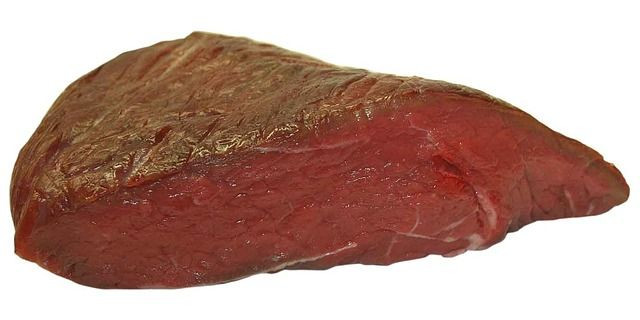Dietary Compound In Red Meat Causes Heart Disease, Rather Than Saturated Fat And Cholesterol

Of mice and men, much has been said -- but thanks to a combination of animal and human studies researchers may now know why red meat causes heart disease.
A dietary compound found in red meat and used as an ingredient in energy drinks has been found to be major contributing factor to hardening of the arteries, according to a study published today in the journal Nature Medicine.
Suspecting saturated fat and cholesterol of playing only minor roles in heart disease, researchers at the Cleveland Clinic found culpability in the body's digestive process, as an obscure chemical expelled by bacteria in the stomach, carnitine, is converted by the liver into a chemical called TMAO, which then moves into the bloodstream.
A bit more, but not too much, about TMAO: Trimethylamine N-oxide is an organic compound that is a common metabolite in animals, found in abundance in red meat and crustaceans and as an ingredient in energy drinks, energy pills and some weight-loss products.
In the small study, with six men and six women, Dr. Stanley Hazen and his colleagues found evidence to implicate the compound. Five of the study subjects experienced a "burst" of TMAO following the 8 ounce sirloin steak meal, whereas one of the diners - normally a vegan - did not. The researchers also found that TMAO caused heart disease in mice, supporting evidence from additional studies of vegans and meat eaters showing more of the compound in the bloodstream of the latter group.
Moreover, researchers found in the human study that meat eaters swallowing carninite pills experienced a TMAO surge immediately afterward, unlike vegans who'd not consumed meat for at least a year.
"It's really a beautiful combination of mouse studies and human studies to tell a story I find quite plausible," said Dr. Daniel J. Rader, a heart disease researcher at the University of Pennsylvania School of Medicine, who was not involved in the research.
Researchers hope the findings lead to a new treatment for heart disease and perhaps even an antibiotic to rid the body of the bacteria responsible for converting carninite to TMAO. They might also find a new way for doctors to screen patients for heart disease risk, by looking for the compound in the blood.
Dr. Frank Sacks, a professor of cardiovascular disease prevention at the Harvard School of Public Health, called the findings impressive. "I don't have any reason to doubt it, but it is kind of amazing."
Hazen, chairman of the department of cellular and molecular medicine at the Lerner Research Institute at the non-profit Cleveland Clinic, declined to say people should avoid eating red meat entirely, however, pointing out the benefits of protein and B vitamins. But he acknowledged that vegans, or those who had not eaten red meat in a while, had lower levels of the gut bacteria that converts carninite to TMAO - meaning a lowered risk of heart attack and death.
"We did not expect to see such a dramatic difference," said Hazen, who added that he's cut down on red meat, in recent years.
Published by Medicaldaily.com



























